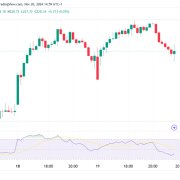
As of September 2024, Eurozone central banks, collectively known as the Eurosystem, are grappling with significant financial losses.
A recent Fitch Ratings report highlights that both national central banks (NCBs) and the European Central Bank (ECB) are experiencing mounting losses due to increased interest expenses on commercial bank reserves.
This evolving financial strain raises questions about the future of monetary policy and the sustainability of central banks throughout the Eurozone.
Over the past decade, the Eurosystem implemented extensive quantitative easing (QE) measures to stimulate the economy following the financial crisis.
Central banks injected liquidity by purchasing substantial quantities of government bonds and other securities, significantly increasing bank reserves.
However, the shifting economic landscape has intensified the interest costs associated with these reserves, creating a considerable financial burden.
Fitch Ratings projects that the Eurosystem will face aggregate losses exceeding EUR 160 billion between 2024 and 2028.
This amounts to approximately 0.2% of GDP annually, illustrating that the repercussions of QE will persist for years to come.
Financial strain on national central banks
The rising losses disclosed by NCBs are raising concerns about their capital adequacy.
The depletion of provisions and reserves could limit the ability of these central banks to provide financial support to their governments.
This situation adds additional pressure to public finances in many Eurozone countries, exacerbating existing fiscal challenges.
Among the largest NCBs analyzed by Fitch, the Bundesbank and Banque de France are particularly vulnerable, having exhausted their risk-mitigation strategies.
These institutions face heightened financial strain and potential limitations on their operational flexibility.
Will the losses impact monetary policy decisions?
Despite the worsening financial conditions, Fitch Ratings does not anticipate that these losses will directly impact monetary policy decisions.
The credibility of central banks remains intact, as governments are unlikely to be compelled to recapitalize them.
Central banks are expected to maintain positive net equity and manage losses through forward transfers, allowing them to continue operations without major political fallout.
The primary mandate of these institutions—controlling inflation and promoting economic stability—remains unaffected by current budgetary pressures.
Thus, while financial challenges persist, they are not expected to undermine the overarching goals of monetary policy.
‘Paper’ losses
In addition to operational costs, Eurosystem central banks are contending with “paper” valuation losses on bonds acquired during QE, potentially amounting to up to 3% of the eurozone’s GDP.
These losses will only be realized if the banks choose to sell the bonds before they mature.
Consequently, while these figures may appear alarming, they may not have an immediate impact on central banks’ financial health unless triggered by bond sales.
The outlook for Eurozone central banks could improve as the ECB adjusts its policy rate and contracts its balance sheet, potentially reducing interest expenses.
Despite ongoing economic concerns and a rising interest rate environment, strategic monetary management remains crucial.
While these losses pose issues for capital and public finances, they are unlikely to significantly disrupt monetary policy or the overall stability of the Eurosystem. The evolving economic landscape and ECB policy adjustments will play a pivotal role in shaping future recovery and stability.
The post Fitch Ratings forecasts €160 billion losses for Eurosystem between 2024 and 2028 appeared first on Invezz











